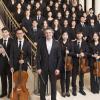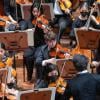
As the country’s symphony orchestras continue to undergo financial crises, hundreds of youth orchestras, serving over 100,000 young musicians, keep going — with a few unfortunate exceptions.
The Bay Area is a special place for these organizations, home to the world-famous San Francisco Symphony Youth Orchestra, the Young People’s Symphony Orchestra (the country’s second oldest), and many others, including the Peninsula Youth Orchestra (PYO), which is in the news thrice this week.
On May 19, Mitchell Sardou Klein, who co-founded PYO with Sara Salsbury in 1997, will conduct the orchestra’s season finale at Carlmont High School.
On June 14, Klein will lead a preview concert ahead of PYO’s European tour, showcasing the music (by Gwyneth Walker, Dmitri Shostakovich, Alberto Ginastera, and Tchaikovsky) to be performed in Budapest, Prague, and Vienna. This will be Klein’s 12th and final international tour with the orchestra.
And in July, after the tour, Klein will retire, turning the leadership of PYO over to Brad Hogarth. Klein will continue his work with the Peninsula Symphony and the Irving M. Klein International String Competition.

Salsbury, PYO’s general manager and director of preparatory orchestras, recalls her first view of Klein, a PBS television program about him and the Peninsula Symphony (where he has been music director since 1985):
“Everything he said — about the value of being in a community orchestra, about the value of playing an instrument — spoke to me. I knew I wanted to work with him.” Over lunch, the two decided to fill a gap in San Mateo County’s cultural life by founding its first youth orchestra, one that would “combine community-orchestra values with youth-orchestra education and produce excellent concerts.”
PYO has some 400 musicians ages 6–18, with a senior orchestra, three preparatory orchestras, two string ensembles, and a flute ensemble.
The young musicians study traditional orchestral repertoire, with an emphasis on contemporary literature and works by American composers. The organization prioritizes community and accessibility, offering need-based financial aid and loaner instruments and accepting applicants regardless of whether they have private music teachers.
Since 1999, the advanced ensembles have toured Finland, Latvia, Estonia, Germany, England, Ireland, France, Spain, Italy, Austria, the Czech Republic, Hungary, Belgium, Holland, Japan, China, Australia, and New Zealand.
On tour, PYO has performed in prestigious venues such as the Sydney Opera House, the Liszt Academy, Dvořák Hall, and the Palau de la Música Catalana, collaborating with guest soloists and earning accolades and awards.

Klein says of his long tenure with PYO:
“It has been truly exhilarating and rewarding to work with the gifted young musicians of PYO over these (almost) three decades. Seeing them grow in confidence as orchestral players, feeling their energy as expressive musical artists, and following their subsequent lives as accomplished adults is a facet of my career that I had not anticipated.
“We’ve performed in many of the greatest concert halls in the world, traveled to remarkable places and cultures, and shared amazing experiences. As I continue to focus on my other musical responsibilities, I will enjoy seeing this ensemble continue to thrive under the baton of a marvelous conductor, Brad Hogarth.
“I offer my thanks to the many people who have collaborated over the years to make this possible — parents, staff, community supporters — and especially to Sara and Phil Salsbury through this entire time.”
PYO’s current operating budget is $640,000, not including the 2024 tour. Annual membership fees range from $915 to $1,260 (depending on the ensemble), accounting for about 60 percent of the annual budget. Approximately $20,000 is earmarked for partial and full scholarships for about 20 musically qualified students with demonstrated financial need.
Individual donations come from families of current members, alumni families, friends and relatives, and other members of the community at large. Support is also provided by the David and Lucile Packard Foundation, the Bernard Osher Foundation, and the Hurlbut-Johnson Foundation.
Nick Cotter, a PYO alum who graduated in 2011 and has stayed involved with the orchestra and was a member of the search committee for Klein’s successor, said:
“What makes PYO unique is the people there, the culture. It’s not just a youth orchestra but an organization to which you belong. Maestro Klein doesn’t need to demand excellence from his students because he just inspires it. He is someone who knows how to teach students the technical aspects of music but also understands that at its core music is about bringing people together. You can tell [that] when he’s on the podium, he’s enjoying everything he’s doing.
“He treats his students like professionals who can reach full potential but does it in the most positive, constructive, encouraging way. He obviously cares about his students after they graduate and how well they do.
“The experience I had in PYO was a big reason I chose to study music in college and grad school. The people I met there are people who I still keep in touch with today and are some of my best friends. Maestro Klein really encourages an atmosphere of collaboration and positivity.”




